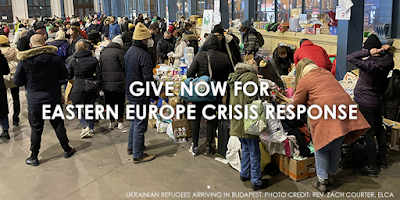“But when you give alms, don’t let your
left hand know what your right hand is doing…” (Matthew6:3)
I saw a young woman on TV last night being interviewed by a reporter. She might’ve been in her late teens or early twenties. I really couldn’t tell. She had two-tone hair like they have these days and was wearing a puffy winter coat. She spoke flawless English with a North American accent and, if I met her on the streets of Philadelphia, I’d swear she was a regular American girl. But she was in Ukraine, and she and others were busy knotting a camouflage net to hide weapons from the advancing Russian army.
For the last week our collective hearts have been aching for this fledgling democracy. Granted, the horrors suffered in Ukraine may be no less horrific than those suffered in other parts of the world. It’s just been easier for Americans to ignore the suffering of South Sudan, Yemen, or Syria. These places seem more exotic and the threats they face more distant. But Ukrainians are now at the mercy of a brutal megalomaniac whose finger hovers over the atomic button. Any escalation of this crisis can, with a blinding flash of light, reduce us all to ashes.
The ashes we wear on our foreheads seem, in a way, superfluous on this Ash Wednesday. We need not be reminded of our mortality when we witness death and senseless destruction on our TV or computer screens. Perhaps our angst increases with a sense of déjà vu. Like the appearance of a variant of the virus we thought we’d conquered, the threat from Russia reminds us that the Cold War never ended. It only became dormant, and now a new and dangerous strain has emerged to plunge us into a world of uncertainty.
We enter this holy season confused and shaken, yet leaning on the words of Jesus from our gospel—instructions on how we are to observe the historic disciplines of this time. We don’t need to make a show of what we do. We need to do what we do—pray, fast, and give alms.
We might chuckle this year at the idea of a Lenten fast. After all, COVID-19 has put us on an enforced fast for the last two years. We’ve abstained from gatherings, we’ve lost things which were familiar and comfortable, and we’ve postponed weddings and travel. We’ve sheltered in our homes and now, as we cautiously emerge from our exile, praying the risk of viral infection has subsided, we find so many things are no longer the same.
Yet God has not changed, and our fast has not weakened us. Rather than concentrating on what we’ve done without, we may wish to be thankful for the abundance of God’s faithfulness. Rather than emerging from mask mandates with gleeful self-indulgence, we may want to take a step back, see our common humanity, and ask what our responsibilities are to one another. Rather than lamenting inflation, we may challenge ourselves to see how moderate living will enable our generosity.
We are called to be generous. The need of hundreds of thousands of our fellow creatures is being paraded in front of us by our news outlets. Our right hand need not inform our left of what it is doing. We don’t need to stop and ask if we can afford to stretch our own resources. We simply do what the discipline of the season requires, secure in the knowledge of God’s faithfulness.
I don’t wish to beat any drums, but today I’ve made a donation to Lutheran World Relief’s Eastern Europe Crisis Response. I believe this is an act of faith, and a better witness than any sermon I could preach. When we give, we give in the assurance that our Father who sees in secret knows our needs.
As for prayer, it is never just a Lenten discipline. It is a part of us—what we do every day, at all times, without ceasing. Let us continually pray for peace in this world.

No comments:
Post a Comment